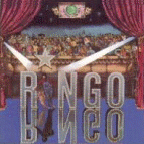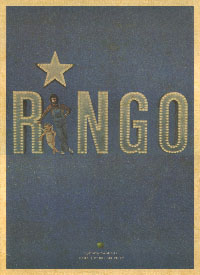![]()
  |

Ringo
Ringo Starr
Apple 3413
Released: November 1973
Chart Peak: #2
Weeks Charted: 37
Certified Gold: 11/8/73
 Four and a half years after Let It Be, a Ringo Starr album is the first to actually invoke the Beatles' aura. He has enlisted the help (the "band-aid," as one song calls it) of John, Paul and George as well as Beatles lieutenants Nicky Hopkins, Klaus Voorman and Billy Preston. One song, "Devil Woman," mentions Sexy Sadie, while "I'm The Greatest" is a career retrospective in which we are reminded of Ringo's place in "the greatest show on earth" and his incarnation as Billy Shears. In Beatles fashion, Ringo has the closure of a stage show or a movie, and over the long dissolve Ringo recites the credits, mentioning John and George and Paul consecutively. It is as a reunion that Ringo is most conscious and proudest of his work.
Four and a half years after Let It Be, a Ringo Starr album is the first to actually invoke the Beatles' aura. He has enlisted the help (the "band-aid," as one song calls it) of John, Paul and George as well as Beatles lieutenants Nicky Hopkins, Klaus Voorman and Billy Preston. One song, "Devil Woman," mentions Sexy Sadie, while "I'm The Greatest" is a career retrospective in which we are reminded of Ringo's place in "the greatest show on earth" and his incarnation as Billy Shears. In Beatles fashion, Ringo has the closure of a stage show or a movie, and over the long dissolve Ringo recites the credits, mentioning John and George and Paul consecutively. It is as a reunion that Ringo is most conscious and proudest of his work.
Ringo was always the figure of conciliation within the most genial, conceivably the most sensible, and the one with the smallest axe to grind. His very lapses bespoke the esteem in which the others held him; had they not liked him so much, those perfectionists would never have allowed him to sing. Perhaps because as the drummer he stood outside the process of creation, he had the best perspective from which to see the Beatles as a unity.
 Click image for larger view. |
Lennon's lyrics to "I'm The Greatest" express why Ringo is the rallying point and keeper of the flame. Although Ringo sings it in a boastful first person, what is really being conveyed is John's comprehension, admiration, even envy of Ringo. Because Ringo seems so content he hasn't required John's compensatory claims of genius. Sings Ringo: "All I want to do is boogaloo."
Does the presence of the other three Beatles make the difference all of the hoopla surrounding this record would demand? Producer Richard Perry's pre-release remarks said it did, and I would have to agree. Ringo's three most wonderful songs are "I'm The Greatest," on which John harmonizes and George plays lead; "Photograph" (co-written by G. Harrison and R. Starkey), on which George sings harmony and plays 12-string, and "You and Me (Babe)," authored by George and Beatle road manager Mal Evans on which George again plays lead.
On "I'm The Greatest" the only cut on which any three of the four appear, a stunning alchemy occurs. The small matter of John's pungent, sardonic backup vocal, and a Harrison guitar part which burns like gonorrhea, energize this song beyond all explanation.
"Photograph" has the kind of intro which is important not so much for its resemblance to a song about to follow as its pull on the listener. Ringo mourns, "But all I've got is a photograph/ And I realize you're not coming back anymore," but the effect is warming. A big production -- a bed of acoustic guitars plus orchestra and chorus arranged by Jack Nitzche -- is bent to homely ends.
"Hold On" is one of Randy Newman's thumbsucking sulks; his baby's taking advantage of him, but he's too much the type that's always being taken advantage of to do anything about it. Dorsey Burnette's "You're Sixteen," with Harry Nilsson on backup vocal, is digestible trivia and continues the note of whimsy. Nicky Hopkins' off-the-beat piano at the end is fun. "Sunshine Life for Me (Sail Away Raymond)" is a modal banjo tune by George on which is found the Band less Richard Manuel. It never manages to transcend its idiom, much less to fulfill it.
"Oh, My My" pumps away with great boisterousness. It prescribes rock & roll as a medical panacea; we finally discover what the rockin' pneumonia and the boogie-woogie flu really are. "Step Lightly" is about as plodding as Johnny Cash ever gets, and "Devil Woman," with lines like "You look so good and you look so fine,/ And one of these days I'm gonna make you mine" is more silly than predatory. Klaus Voormann's depiction of this devil woman (his lithographs accompany the lyrics to each of the songs) is a lot more jarring than Ringo's.
Amid the diversity of these selections, a portrait of Ringo's musical tastes does emerge. Free of the other Beatles' influence, he drifts along in his own way, displaying a penchant for novelty songs and ethnic music. If his taste is pop, it is pop as it was defined 15 years ago.
"Six O'Clock" is Ringo's appearance with the McCartneys. While the song has a certain slight charm, it doesn't smack of "I'm The Greatest" or "Photograph" or "You and Me (Babe)"'s collaborative feeling. Ringo is merely grafted onto a typical McCartney confection.
It is the infectious "You and Me (Babe)," Ringo's final song, into which all the bittersweet reunion sentiments pour. George on this cut plays better than he has in years; his uncanny knack for peeling away the harmonies and realigning them is fully with him here. He keeps cooking well into the fade-out.
The "babe" of the title is actually the audience to whom he is bidding adieu, but the good-bye is as much dedicated to the people who helped make this album, and he thanks them by name. The album is the document of the good time had in its making.
- Ben Gerson, Rolling Stone, 12/20/73.
Bonus Reviews!
Just the best Ringo Starr album ever. We all know already that "Photograph" has got to be a No.1 single this month, right? Rest of the album is comparably enjoyable. Rich Perry and his cadre of superstar session helpers have created another stunning production package. Highly varied song selection with Ringo, Harrison, McCartney and Lennon all on tap as musicians and writers.
- Billboard, 1973.
Further reading on Super Seventies RockSite!: Album Review: Single Review: Article: 'Ringo's Liverpool |
On first listening the album does nothing. The single "Photograph" is the weakest track. But then there's the strange and perfectly charming "You're Sixteen" which features Harry Nilsson singing an incredibly tasty back-up and a great rocker called "Devil Woman" that may never make it to AM radio but which is genuinely clever and well performed. And then, Paul McCartney appears all over the album, even though he's never very close to John Lennon. He wrote a song for Ringo called "Six O'Clock" which is very sweet and gentle. Linda and Paul sing back-up choruses and Linda mercifully chose to leave all the heavy work to Paul who deftly played piano and synthesizer and arranged the strings and flutes.
Country music was always very big in Liverpool, and it still is. Ringo always loved country music (and sang it with flair and a good sense of humor). Now George Harrison has written Ringo a country song called "Sunshine Life For Me (Sail Away Raymond)" and also does a great job singing twangy counterpoint to Ringo's lead.
When Mr. Starr went into the studio to make this LP the buzz went out that the Beatles were getting back together. Well, in a way they have, they're about as together as they were when they did Let It Be. All the boys love the gentle little Ringo who never did anything to hurt anybody and who at no time took sides. When his time came to fill his recording commitments everyone did their part to see it was as good as possible, and in doing so they have created the most commercially effective and creatively satisfying work John, Paul, George and Ringo have made in years... and let's face it even though they never all made it simultaneously into the control room, they did all make it to some part of the sessions and this is the closest thing to a truce ever. More please.
- Janis Schacht, Circus, 1/74.
This is not a Beatles album but a Ringo album -- a likable curiosity. Ringo's droll sincerity was always good for a change of pace; his songs were wonderful in context. Here that context is provided by an occasional harmony (especially John's on "I'm the Greatest") that makes me long for much, much more. It might be different if the songs were all as good as "Photograph," but without a real singer to work with, Richard Perry cannot transmute questionable material into magic. And don't kid yourself -- the Beatles could. B-
- Robert Christgau, Christgau's Record Guide, 1981.
One of the great Beatle solo albums, and the only one to feature a little help from all three ex-friends in the band. Starr's apex. The 1991 CD reissue of Ringo contains three bonus tracks, the hit single "It Don't Come Easy," the autobiographical B-side "Early 1970," and "Down and Out." * * * *
- Jeff Tamarkin, The All-Music Guide to Rock, 1995.
The million-selling Ringo album is recommended for those who like their rock 'n' roll Hollywood-style. It includes Ringo's, uh, theme song -- "I'm the Greatest," one of the most sarcastic songs John Lennon ever wrote. The CD reissue adds "It Don't Come Easy" and some other tracks to make it almost a de facto best-of itself. * * * 1/2
- Gary Pig Gold, Musichound Rock: The Essential Album Guide, 1996.
![]() Reader's Comments
Reader's Comments
No comments so far, be the first to comment.
